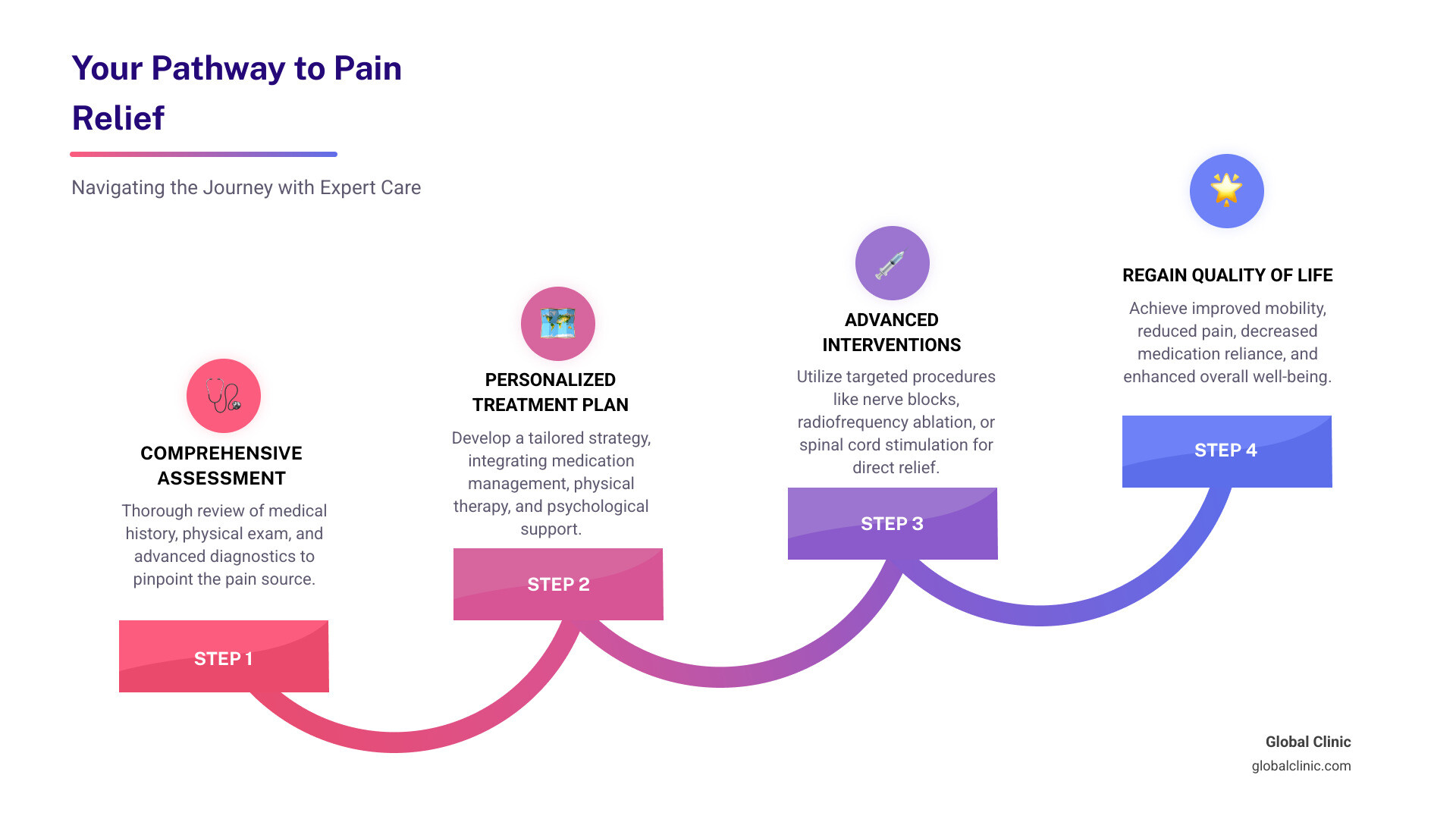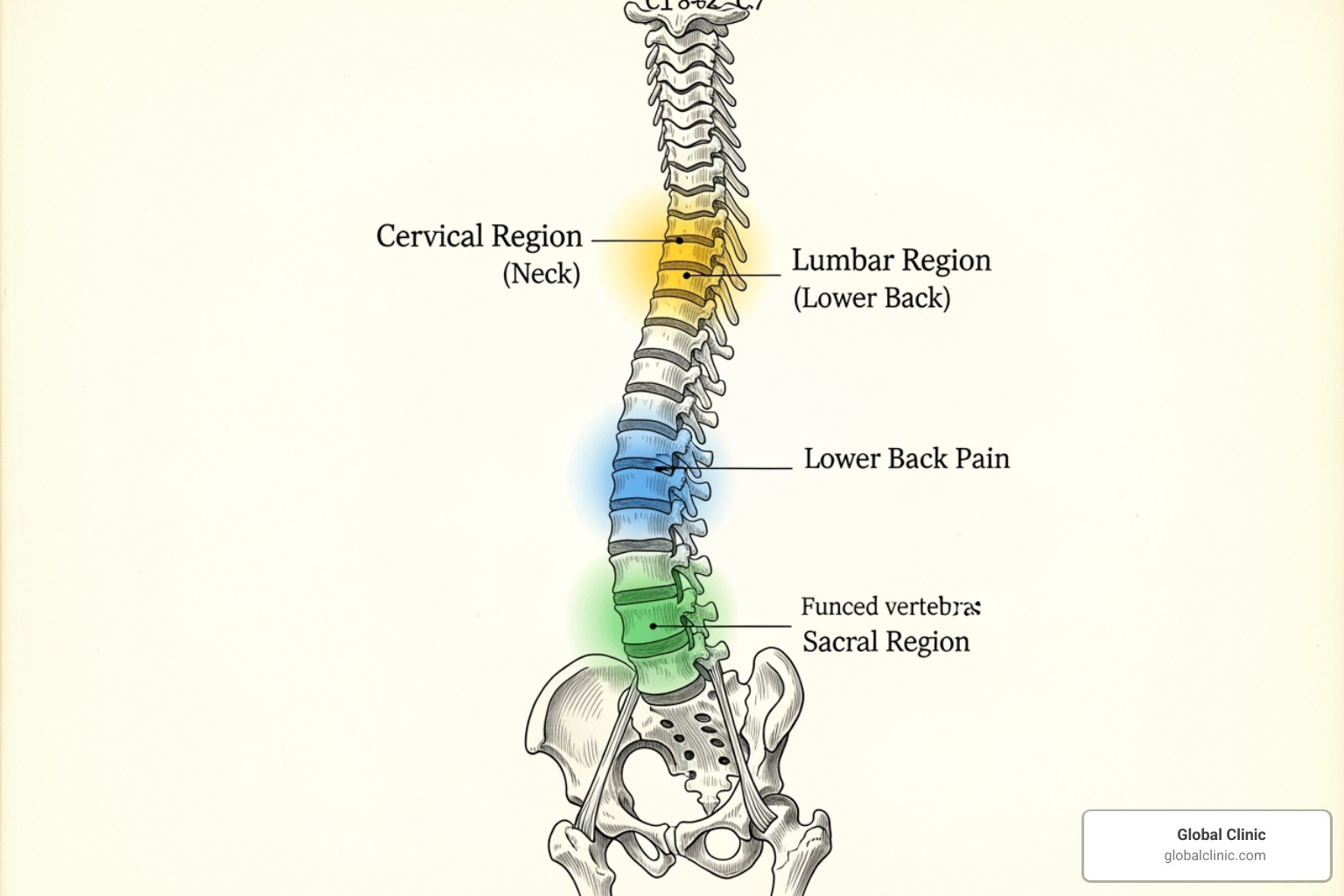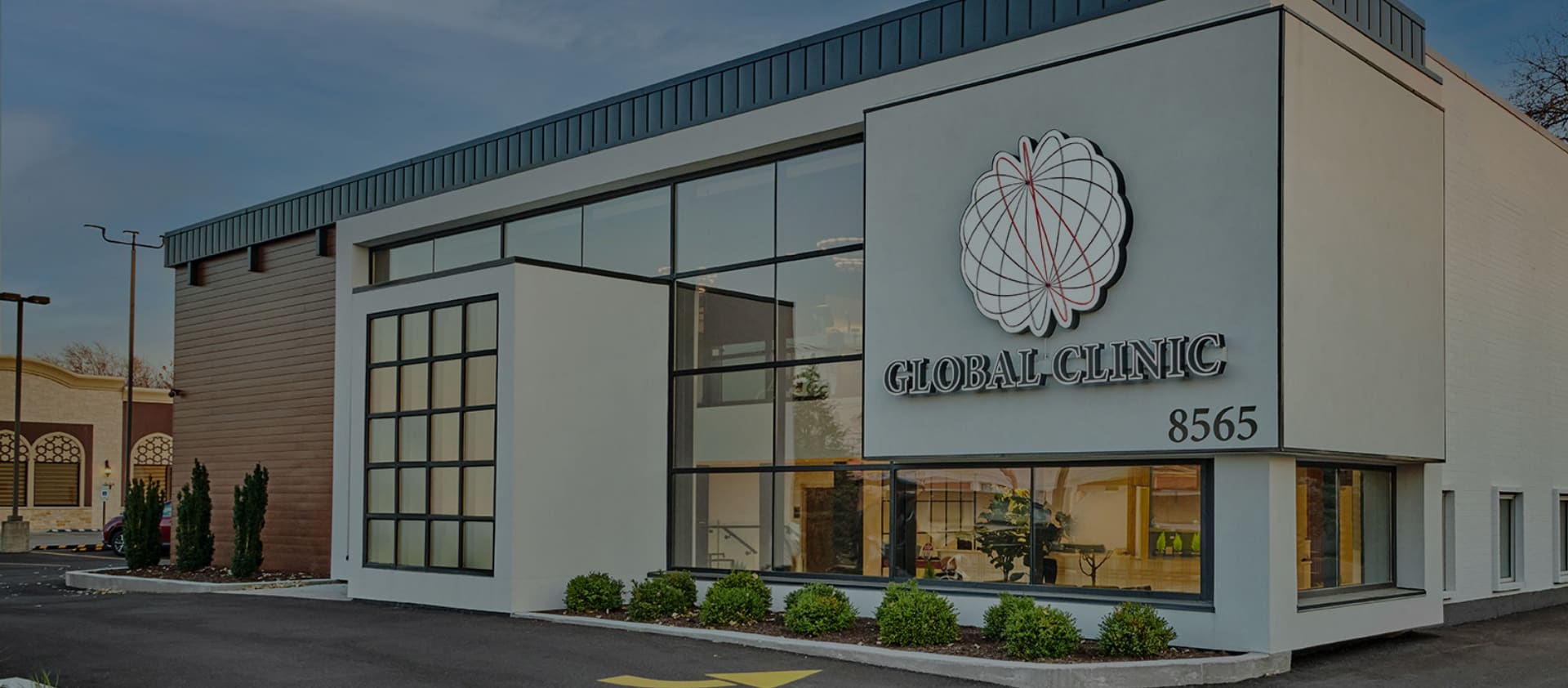Why Finding the Right Pain Management Specialist Matters
Consultants in pain management are medical specialists who diagnose and treat both chronic and acute pain. They use advanced, personalized treatment plans to help patients regain their quality of life without relying solely on medication.
Quick Guide to Pain Management Consultants:
- Anesthesiologists – Specialists in nerve blocks and interventional procedures
- Physiatrists (PM&R) – Focus on rehabilitation and functional improvement
- Neurologists – Experts in nerve-related pain conditions
- Orthopedic surgeons – Specialize in musculoskeletal pain
- Allied professionals – Physical therapists, psychologists, and nurse practitioners
Pain affects millions of people. Acute pain typically lasts less than three months, often from an injury or surgery. Chronic pain persists for months or years, long after an initial injury has healed.
The good news is that research shows more than 80% of patients notice improvement in their quality of life after only 1 or 2 visits to a qualified pain management specialist.
Whether you have back pain, arthritis, or headaches, the right consultant is crucial. This guide explains what they do, how to find one, and what to expect from modern treatments.
I’m Ana Vinikov, Practice Manager at Global Pain & Spine Clinic. For years, I’ve connected patients with our experienced consultants in pain management. I’ve seen how the right specialist can transform lives with personalized care that goes far beyond just prescribing medication.

Understanding the Role of Consultants in Pain Management
Living with chronic pain is overwhelming, but consultants in pain management are specialized advocates who can help. As a medical specialty, pain medicine focuses on finding the root cause of your pain to help you reclaim your life. Specialists know that pain is more than physical—it affects your sleep, relationships, and daily activities.
Pain management consultants use a collaborative approach, working with your primary care doctor, physical therapists, and other specialists to create a comprehensive, personalized treatment plan. Many are also researchers and educators, ensuring you benefit from the latest advances in pain medicine. At Global Clinic, this dedication means our consultants bring cutting-edge knowledge to your treatment plan for better outcomes.
Who Are Pain Management Specialists?
A pain management team brings together doctors from different backgrounds, each offering unique expertise to solve your pain puzzle.
- Anesthesiologists are experts on the nervous system, making them skilled at procedures like nerve blocks and injections for targeted pain relief.
- Physiatrists, or Physical Medicine and Rehabilitation (PM&R) specialists, focus on improving daily function by helping you build strength and mobility.
- Neurologists specialize in pain from nerve damage or dysfunction, such as neuropathy or complex headaches.
- Orthopedic surgeons identify structural problems and often work with pain teams to explore non-surgical options first.
- Rheumatologists treat pain from inflammatory conditions like arthritis by addressing the underlying disease.
The team also includes physical therapists for guided exercise, psychologists for emotional coping strategies, and, at Global Clinic, chiropractic specialists for additional hands-on treatments.
Qualifications and Credentials to Look For
When choosing consultants in pain management, focus on credentials that demonstrate true expertise.
- Board certification is your starting point. It ensures the doctor has passed rigorous exams in their primary specialty (e.g., Anesthesiology) and in Pain Management.
- Fellowship training is also key. This is an extra year of specialized training in advanced pain diagnosis and treatment after a doctor completes their residency.
- Professional memberships in organizations like the International Association for the Study of Pain (IASP) or the American Society of Interventional Pain Physicians (ASIPP) show a consultant stays current with the latest research.
- Specialized credentials like D.ABA (PM) or FRCPC (for Canadian-trained physicians) signify comprehensive, advanced training.
- Experience with your specific condition is crucial. Expertise in areas like spinal disorders or fibromyalgia can significantly improve your outcome.
Common Conditions and Advanced Treatment Options
Finding the right treatment for chronic pain can be overwhelming. At Global Clinic, we’ve helped Northern Chicago residents for over 20 years with personalized, non-surgical solutions. Our philosophy is that every patient’s pain is unique, so treatment plans must be personalized. We take time to understand how pain affects your entire life.

What Conditions Do Pain Management Consultants Treat?
Our specialists treat a wide range of conditions that cause pain throughout the body.
- Back and neck pain are among the most common conditions we treat. Understanding the anatomy of the spine and peripheral nervous system is key to targeting the pain’s source.
- Sciatica and nerve pain often travel far from the source. It’s important to distinguish between conditions like sciatica and piriformis syndrome, as explained in our guide on Piriformis Syndrome vs. Sciatica.
- Arthritis and joint pain in the shoulders, hips, and knees can be managed to help you continue your favorite activities. Our guide to Living Comfortably with Knee Arthritis offers practical strategies.
- Spinal stenosis, a narrowing of the spinal canal that compresses nerves, is a common cause of back and leg pain. The National Institute of Health explains what spinal stenosis is in detail.
- Headaches and migraines can be debilitating. Our specialists offer advanced treatments beyond basic pain relievers, including Botox injections for chronic cases.
- Fibromyalgia involves widespread pain and fatigue. We use comprehensive, multi-therapy approaches to manage symptoms and improve daily function.
- Post-surgical pain, sometimes called failed back surgery syndrome, is persistent discomfort after an operation that requires specialized attention.
Latest Technologies and Minimally Invasive Techniques
Modern pain management offers incredible technological advances for providing relief without major surgery or heavy reliance on medication. These are proven, life-changing techniques.
- Interventional procedures are a core part of our advanced treatments. These minimally invasive techniques use image guidance (X-ray or ultrasound) to precisely target the source of pain.
- Radiofrequency Ablation (RFA) uses heat from radio waves to interrupt nerve pain signals, providing relief for months or even years.
- Peripheral Nerve Stimulation uses a tiny implanted device to send gentle electrical pulses to a specific nerve, disrupting pain signals before they reach the brain.
- Spinal cord stimulation is for difficult-to-treat back and limb pain. An implanted device sends mild electrical pulses to the spinal cord, masking pain signals. It’s a life-changing alternative to major surgery or long-term medication.
- Regenerative medicine aims to repair damaged tissue, not just manage pain. Treatments like platelet-rich plasma (PRP) and stem cell therapy promote the body’s natural healing.
- Nerve blocks and injections are sophisticated procedures where specialists inject anesthetic or anti-inflammatory medication to reduce inflammation and block pain at the source.
Most of these advanced treatments are outpatient procedures performed in our facility, allowing you to go home the same day.
The Power of a Multidisciplinary Team Approach
Chronic pain isn’t just physical; it affects your entire life. That’s why a multidisciplinary team of specialists is essential to tackle pain from every angle. No single treatment can address all aspects of chronic pain. Our integrated care model at Global Clinic brings specialists together as a team, combining therapies for a more effective approach than trying one treatment at a time.

What is a Multidisciplinary Treatment Plan?
A multidisciplinary treatment plan provides a coordinated team of experts focused on getting you back to your life. The process starts with a comprehensive assessment where the team evaluates your physical symptoms and how pain affects your daily activities, sleep, and mood.
This leads to a plan that combines interventions for maximum effect. A plan might include:
- Medication management to find the lowest effective doses and reduce dependence on opioids.
- Interventional procedures like nerve blocks to calm inflammation.
- Physical therapy to build strength and learn how to move correctly. Our guide on Addressing Back Pain with Physical Therapy shows how powerful targeted movement can be.
- Psychological support to develop coping strategies for the emotional toll of chronic pain.
- Lifestyle modifications to sleep, movement, and stress that can have a huge impact on pain levels.
Why This Approach is More Effective
This approach works because it matches the complexity of chronic pain with a comprehensive solution.
- It addresses all aspects of pain: We treat root causes, not just symptoms. For example, back pain might require addressing weak muscles, poor posture, and stress simultaneously.
- It reduces reliance on medication: As other treatments work, the need for pain medication often decreases, reducing the risks of long-term use.
- It improves functional ability: The goal is to get you back to your life—playing with kids, sleeping well, and enjoying hobbies.
- It empowers patients: You learn to manage your condition, including flare-ups and preventative exercises, which gives you confidence and control.
- It provides long-term results: By addressing root causes, we help you build a foundation for lasting relief, not just a temporary fix.
At Global Clinic, we’ve refined this team approach for over 20 years. We know collaboration leads to patients getting better faster and staying better longer.
How to Find and Choose Your Pain Specialist
Finding the right consultants in pain management is a critical step in your recovery. With thoughtful research, you can find a specialist who understands your needs and goals. The right specialist-patient relationship is key to reclaiming your life from chronic pain.

Steps to Finding a Reputable Clinic
Follow these steps to find the right care team:
- Start with a referral. Your primary care physician knows your medical history and can refer you to trusted specialists.
- Research online reviews. Look for patterns in feedback regarding communication, wait times, and overall satisfaction, but every patient’s experience is unique.
- Verify credentials. Ensure any consultant you consider is board-certified and has completed fellowship training in pain medicine. This information is usually on the clinic’s website.
- Consider hospital affiliations. Affiliation with a reputable hospital can indicate higher standards of care and access to advanced facilities.
- Ask about their treatment philosophy. Inquire if they emphasize multidisciplinary, non-surgical, and non-opioid solutions to ensure their approach aligns with your values.
Choosing the Right Consultants in Pain Management for Your Needs
Once you have a shortlist, you must actively participate in choosing the best specialist for you.
- Make the most of your consultation. Use this meeting to get a feel for the team’s approach and see if it’s a good fit. Come prepared with questions about your condition and past treatments.
- Ask key questions. Inquire about their experience with your condition, typical treatments and timelines, success rates, and their use of real-time image guidance for procedures.
- Evaluate their communication style. A good consultant listens, explains concepts clearly, and makes you feel comfortable asking questions. You shouldn’t feel rushed.
- Look for personalized care. Your pain is unique, so your treatment plan should be too. Avoid one-size-fits-all clinics. A personalized approach is central to our success at Global Clinic.
- Understand the financial aspects. A reputable clinic will be transparent about costs, insurance coverage, and potential out-of-pocket expenses. Our team at Global Clinic can help you steer these questions.
The right specialist will be a partner in your care, focused on your long-term well-being. Trust your instincts and seek a second opinion if something feels off.
Frequently Asked Questions about Pain Management Consultants
Considering pain management can be overwhelming. After 20 years of serving the Northern Chicago community, we’ve heard many questions from patients about their journey to relief. Here are answers to the most common questions to help you feel more confident.
What should I expect during my first visit?
Your first visit is designed to be thorough and comfortable, ensuring you feel heard. It will typically include:
- A Comprehensive Medical History Review: We will discuss your pain story in detail, including when it started, what affects it, and how it impacts your life. We’ll also review past treatments and current medications.
- A Physical Examination: We will assess your movement, posture, range of motion, and strength to identify areas of tenderness or stiffness.
- A Discussion of Pain Symptoms: You’ll have time to describe your pain in detail (e.g., sharp vs. dull, radiating). These details help us diagnose the cause.
- Diagnostic Tests: We may recommend X-rays or MRIs to get a clearer picture of the issue, and we will explain why any test is needed.
- An Initial Treatment Plan Discussion: By the end of the visit, we will discuss our preliminary thoughts on the cause of your pain and outline potential next steps, ensuring you are comfortable with the plan.
How do I know if I need a pain management consultant?
If pain is affecting your life, it deserves specialized attention. Consider seeing one of our consultants in pain management if:
- Your pain has lasted over three months. Chronic pain requires a different, more specialized approach than acute pain.
- Initial treatments from your primary care doctor aren’t working. If rest, over-the-counter medications, or basic physical therapy haven’t helped, it’s time for a specialist.
- Your pain significantly impacts your daily life. Don’t miss out on work, family, or hobbies because of pain.
- You want non-opioid or non-surgical solutions. We focus on innovative, minimally invasive treatments to provide relief without heavy reliance on medication or surgery.
Even seasonal changes can play a role; understanding how to practice pain management in cold weather can be part of a comprehensive plan.
What are typical patient outcomes?
We love this question because we see great results. Research backs up what we witness in our clinic: more than 80% of patients notice improvement in their quality of life after only 1 or 2 visits.
Typical outcomes include:
- Reduced pain levels: Most patients experience significant relief, allowing them to enjoy life again.
- Improved mobility and function: Patients can often return to activities like climbing stairs, playing with grandchildren, or enjoying hobbies.
- Decreased medication use: Our approach helps many patients reduce or eliminate their need for pain medication, especially opioids.
- Better sleep quality: As pain decreases, sleep improves, breaking the vicious cycle of pain and sleeplessness.
- Improved overall quality of life: Patients regain confidence, reduce anxiety, and get back to living fully—returning to work, planning vacations, and enjoying social time.
At Global Clinic, these outcomes are why we are committed to providing the personalized, innovative care that has served Northern Chicago families for over two decades.
Take the Next Step Towards a Pain-Free Life
Living with chronic pain doesn’t have to be your reality. As this guide has shown, consultants in pain management can help. The key takeaways are that chronic pain is manageable with the right team, and a multidisciplinary approach offers the best chance for lasting relief. The difference is finding specialists who treat you as a whole person, offer cutting-edge treatments, and believe in your ability to recover.
For residents throughout Northern Chicago and the surrounding communities – including Arlington Heights, Barrington, Crystal Lake, Des Plaines, Elk Grove Village, Glenview, Hawthorn Woods, Kildeer, Lake Zurich, Long Grove, Buffalo Grove, Northbrook, Palatine, Mount Prospect, Schaumburg, Wood Dale, Melrose Park, Franklin Park, Park Ridge, Elmhurst, Wilmette, Skokie, Morton Grove, Evanston, Winnetka, Glencoe, Northfield, Addison, Itasca, Bensenville, Roselle, Glendale Heights, Bloomingdale, Streamwood, Rolling Meadows, Lincolnshire, Schiller Park, Norridge, River Grove, and Elmwood Park – Global Clinic has been providing this comprehensive, personalized approach to pain management for over 20 years.
Our state-of-the-art facility combines physical therapy, chiropractic care, and regenerative medicine. We provide innovative, personalized treatments at affordable prices. Working with our experienced consultants in pain management means gaining a partner in your journey back to the life you love.
More than 80% of patients notice improvement in their quality of life after just one or two visits. Your pain story can change from one of frustration to one of living fully again.
Ready to explore your options? Learn more about our advanced pain control methods and find how personalized care can make all the difference in your recovery journey.


